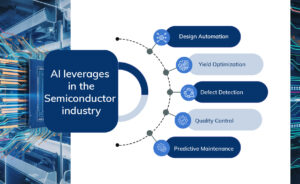India’s semiconductor industry is expanding quickly and is starting to take center stage in the world of innovation and technology.
This industry is poised for a revolutionary journey driven by astute capital allocation and unwavering innovation.
Many of the everyday electronics we use are powered by semiconductors. The industry faces new hurdles in refining old production methods as demand grows for faster, smaller, and more energy-efficient chips.
A new era of innovation, efficiency, and opportunity will be marked by the semiconductor industry’s incorporation of artificial intelligence (AI).
The industry used to mainly act as a catalyst for other high-tech industries. But with artificial intelligence (AI), semiconductors are leading the charge to change the way technology is created, changing the economic environment in the sector.
These developments in semiconductor technology, particularly in chip design, hold great promise for the retail industry, which is depending more and more on technological breakthroughs to streamline operations and enhance customer satisfaction.
Modern digital electronics are fundamentally built around semiconductors, which enable anything from customer analytics tools to shop inventory systems.
When a semiconductor design is finished for a project, engineering teams may now leverage AI to access valuable insights from past data.
Peak engineering productivity is made possible by this, which results in the creation of more reliable, higher-quality goods.
Semiconductor and systems companies are utilizing artificial intelligence (AI) to lower costs, accelerate time to market, and enhance chip design.
According to Deloitte Global, the top semiconductor companies in the world will invest $300 million in internal and external AI tools for chip development in 2023. Over the following four years, that amount will rise by 20% annually to $500 million in 2026.
In this blog, we explore the role of artificial intelligence (AI) in semiconductors, the industry’s impact from AI, how AI is changing the semiconductor sector, and more.
About Semiconductor industry
A substance that is in between an insulator and a conductor is considered a semiconductor. Since silicon conducts electricity more than an insulator like glass but less than a pure conductor like copper or aluminum, semiconductors are typically made of silicon.
By adding impurities, a process known as doping, their conductivity, and other characteristics can be changed to suit the unique requirements of the electronic component in which they are used.

India’s semiconductor industry is currently experiencing a boom as a result of large government investments that are increasing domestic production.
It is made up of companies that design and manufacture transistors and integrated circuits, among other semiconductor devices.
Numerous consumer and business goods, such as automobiles, computers, mobile phones, and personal gadgets, require semiconductors.
Rapid technological progress and a never-ending quest for downsizing characterize this fiercely competitive market, where big firms extensively invest in R&D.
The semiconductor industry is a major force behind innovation and economic growth as a result of society’s growing reliance on electronic devices.
Semiconductor chips, which evolved from being merely tools to the fundamental components of every economic sector over the years, have drastically disrupted every aspect of the industrial landscape.
Semiconductor chips will keep finding their way deep into the accessories of India’s aerospace, automotive, communication, IT, clean energy, military, and other industries.
These trends are being driven by the need for smartphones, cars, and data storage.
The Indian government has put in place some laws and initiatives in recognition of the importance of the semiconductor sector.
‘Make in India’ is a program that was launched in 2014 to increase manufacturing in India and position it as a global manufacturing hub. Several programs, such as the Production Linked Incentive (PLI) program for the electronics industry, have been introduced to encourage the production of semiconductors.
This innovative program provides businesses locating semiconductor manufacturing plants in India with an incentive package valued at $1.7 billion.
This new regulation will create indirect and specialized job possibilities in addition to benefits for semiconductor businesses.
According to Fortune Business Insights, The size of the worldwide semiconductor industry was estimated at USD 611.35 billion in 2023 and is expected to increase at a compound annual growth rate (CAGR) of 14.9% from USD 681.05 billion in 2024 to USD 2062.59 billion by 2032.
![]()
What is the role of AI in Semiconductor
The AI technology stack offers semiconductor companies a lot of opportunities. With AI, these companies could be able to extract 40–50% of the total value from the technology stack, as opposed to the semiconductor industry’s meager share during the PC and mobile phone periods.
Hardware is becoming a crucial factor in AI advancement, with computation memory and storage both growing quickly, and networking controlling the majority of the industry.
Artificial intelligence is revolutionizing many aspects of design, manufacturing, and testing, and it is a vital component of the semiconductor industry.
To maximize chip architecture and performance, artificial intelligence (AI) in design enables engineers to swiftly evaluate massive datasets and identify trends that can be challenging for human designers to notice.
This accelerated the design cycle and increased the capability and efficiency of semiconductor devices. AI also aids in automating the verification process, ensuring the reliability and proper operation of intricate semiconductor designs.
By employing machine learning algorithms to predict potential equipment failures before they occur, semiconductor manufacturers may minimize equipment production efficiency and minimize downtime.
Because AI streamlines processes, robotics, and automation powered by AI significantly increase manufacturing throughput and precision.
Artificial intelligence contributes to the development of advanced testing techniques during the testing phase, which boosts productivity, accelerates innovation, and enhances semiconductor product quality.
AI leverages in the Semiconductor industry
The semiconductor industry is seeing a rise in the use of artificial intelligence (AI).
The design, production, and distribution of electronic devices and components, including microchips, integrated circuits, and sensors, are all part of the semiconductor industry.
Here are a few examples of how artificial intelligence is changing the semiconductor sector:

Design Automation
- Artificial Intelligence is being utilized to automate semiconductor design.
- AI can assist engineers in creating circuits that are more optimized and efficient, given the growing complexity of chips and circuits.
- When done manually, optimizing circuit factors like timing, power, and area takes a lot of time. AI can automate this process.
Yield Optimization
- AI is also being utilized in semiconductor manufacturing to maximize yield.
- The percentage of working chips produced during manufacture is known as yield.
- Artificial Intelligence can examine data from multiple manufacturing stages and detect trends that impact yield. This aids producers in locating and resolving issues that may result in yield loss.
Defect Detection
- AI can assist in finding flaws in the production of semiconductors. Electronic equipment is susceptible to failures and shorter lifespans due to defects.
- Images and data from the manufacturing process can be analyzed by AI to find possible flaws. This can assist producers in avoiding flaws or resolving them before they cause harm.
Quality Control
- In the semiconductor sector, artificial intelligence is also employed in quality control.
- Artificial intelligence (AI) may examine data from sensors and other sources to find flaws and make sure the goods are up to par.
- This can lower the quantity of faulty goods and raise the general quality of semiconductors.
Predictive Maintenance
- Predictive maintenance of semiconductor manufacturing equipment is another application for AI.
- The goal of predictive maintenance is to identify any issues before they arise by evaluating data from sensors and other sources.
- By doing this, you may lower the risk of equipment failure, shorten downtime, and boost manufacturing efficiency.
Generative AI use cases in Semiconductor Design & Verification
Generative AI has multiple applications in the semiconductor design lifecycle that can increase worker productivity, shorten design cycle times, and eventually affect business KPIs like time to market, cost savings, and better products.

Over the past few decades, Electronic Design Automation (EDA) has significantly enhanced chip design productivity, offsetting the increases in transistor density brought forth by Moore’s Law.
Nonetheless, a great deal of challenging chip design issues remain unresolved, especially those about programming and natural languages.
Thanks to recent advances in large language models (LLMs), which are available as commercial and open-source solutions, the front-end, back-end, and production test design stages can now automate various language- and code-related tasks.
LLMs can dramatically improve engineering efficiency and reduce development costs in the chip design process by automating tasks including code creation, bug triage, report preparation, and natural language responses to engineering inquiries.
Choosing the right generative AI approach for semiconductor design and verification
These huge language models’ accuracy is mostly dependent on the quality and volume of training data.
Specifically, these huge language models are not suitable for usage straight out of the box in a production environment because they were trained on a restricted amount of data from the semiconductor domain.
There are two methods for modifying basic models in the semiconductor industry:
- Retrieval Augmented Generation (RAG)
- Fine-Tuning

How AI technology provides opportunities for semiconductor companies
McKinsey predicts that the growth rate of AI accelerator chips, or processors made to operate with neural networks and machine learning, will be about 18% per year, which is five times faster than the growth rate of semiconductors used in non-AI applications.
There will be a sharp increase in the use of neural network technology in general and AI chips specifically for self-driving car technology.
Neural networks are specialized artificial intelligence systems that imitate the organization of the human brain. The networks can interpret sensory data and identify patterns in enormous amounts of disorganized data.
Neural networks are used in various applications such as facial recognition, targeted marketing, autonomous cars, and predictive analysis.
Additionally, they will receive the numerous inferencing processors and AI accelerators they require from the semiconductor industry.
How can semiconductor companies benefit from AI technology
The adoption of AI could lead to expansion in the following semiconductor manufacturing sectors:
- Workload-specific AI accelerators
- Nonvolatile memory
- High-speed interconnected hardware
- High-bandwidth memory
- On-chip memory
- Storage
- Networking chips
Conclusion
Artificial Intelligence (AI) is causing an enormous transformation in the semiconductor industry by altering the design, production, and usage of semiconductors.
Artificial Intelligence (AI) is revolutionizing chip development by increasing energy efficiency and facilitating the development of innovative semiconductor architectures.
AI has the potential to expand the realm of innovation in the semiconductor industry as it develops and becomes more integrated with specialized hardware.
AI must be used properly and privacy and data security issues must be addressed if this business is to benefit the most from it.
Chips that are quicker, smarter, and more sustainable are being made possible by AI and the semiconductor industry working together.
This partnership has the potential to transform technology and advance advancement in ways we could never have imagined.









